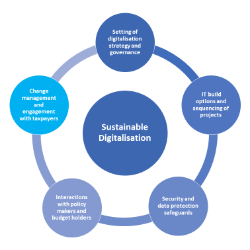Tax Inspectors Without Borders supporting technological developments in tax administrations
by Dr. Amna Khalifa - Project Manager, TIWB Secretariat
2 May 2022
The COVID-19 crisis is illustrating our collective vulnerability, where one weak link threatens the physical and economic health of all. As such, all countries have a direct interest in eradicating the virus and rebuilding economic life throughout the world as a necessity for all. Domestic resource mobilisation, and taxation, in particular, will remain the only long-term viable source of financing—not just for strengthening health systems —but for all public services, investment and the reconstruction of economic life. With fiscal headroom highly constrained, with debt servicing limiting the ability of governments to collect and spend precious tax revenues, the work to build effective tax systems in developing countries has never been more important and must remain in sharp focus. Domestically, this means that many countries will need to strive to increase their tax-to-GDP ratios. For example, the average tax-to-GDP ratios in Africa are 16.6% which is low compared to the average of 33.8% in OECD countries (OECD/ATAF/AUC, 20211). This will include efforts at formalising the economy – bringing more people into the tax, and social protection systems – increasing the use of property and carbon taxes, and improving the performance of personal income tax, especially on the richest. These are underutilised tools in many countries and will broaden the tax base, requiring governments to rebuild the social-fiscal contract with their citizens.
The current crisis also affords the opportunity to assess changes in tax administration. The step changes that digital technology in tax collection can make to the overall efficiency of tax systems and increased revenues stand out as an issue where learning between countries could be accelerated. Evidence from even the lowest capacity countries (e.g. Liberia) suggests investments in digital capability in tax administration can be a game changer2.
We have seen that countries’ response time to address the challenges arising from the pandemic was largely a function of their advancement in the use of technology. Tax administrations more technologically advanced were able to deal better with remote working, substitute in-person and paper communication with virtual or digital means and facilitate taxpayer compliance.
Moving forward, the taxation landscape will be further impacted by the rapid expansion of e-commerce, as digital tools and technology advancements continue to become key aspects of our lives. Increased use of cashless payments, through mobile phones and other devices, electronic cash registers, online marketplaces, and other digital sources will give rise to big data. This data needs to be handled and analysed using artificial intelligence and machine learning, to allow for crosschecking of information and for managing compliance risks. This will require tax administrations to revolutionise their operating models and speed up their digitalisation journey for more efficient and effective ways to raise revenues, improve transparency, facilitate successful and sustainable tax reforms and be resilient to future shocks.
The digital journey, however, comes with its share of challenges and complexities for countries, requiring strategic transformation plans, change management to adopt the new way of working and engaging with taxpayers, adapting to new technologies and sufficient resources. The complexity of the issues involved in digitalisation of tax administrations and the relevant capacities required needs deeper advice and guidance and is often best provided through peer-to-peer engagement. Collaboration and close interactions between tax administrations to share experience is critical for delivering successful digital outcomes. As the number of tax administrations engaged in digitalisation journeys increases, so will the need for partnerships and interaction. Although tax administrations need to address the challenges of digitalisation according to their own requirements, learning from the experience of other administrations can significantly aid their individual journey.
|
TIWB provides a tested and well-established framework to provide peer-to-peer confidential support to senior leaders in developing country tax administrations, on the strategic challenges they will need to address as they embark on their digitalisation journeys. The support will focus on providing advice on key decisions, digitalisation strategies or pursuing digitalisation projects. This will help countries avoid outcomes that are not sustainable, not delivered smoothly and timely, and/or do not deliver value for money. Possible areas include high-level strategic and governance issues, general change management and project management, as well as hands-on support on specific projects as shown in the graphic below. |
Source: FTA Secretariat |
This support fits in well with the other areas of TIWB assistance, which include tax audits, effective use of automatic exchange of information and criminal tax investigations. Digitalisation will help tax administrations in better collection and interpretation of data, including data received under the automatic exchange of information, leading to better risk assessments to identify tax crime and transfer pricing audit cases.
TIWB’s support to tax administrations on digitalisation will complement the efforts supported by other development partners like the World Bank Group and the International Monetary Fund. As international development agencies prioritise their support to partner countries for digitalisation of tax administrations, they must recognise that impact is greater when official development assistance is co-ordinated, harmonised and builds on comparative advantages.
The next steps for TIWB involve the execution of pilot programmes. This will entail identifying developing countries needing support, matching them with tax administrations with relevant experience, agreeing on the areas and types of assistance to be provided; agreement on terms of reference regarding confidentiality, boundaries related to decision-making and non-liability for outcomes; and development of a work plan with clear objectives. These pilots will likely be developed into formal programmes and contribute to TIWB’s wider objective of building capacity and strengthening tax administrations.
[1] OECD/ATAF/AUC (2021), Revenue Statistics in Africa 2021, OECD Publishing, Paris, https://www.oecd.org/ctp/revenue-statistics-in-africa-2617653x.htm.
[2] OECD (2020) Tax and Fiscal Policy in Response to the Coronavirus Crisis, OECD Publishing, Paris, https://www.oecd.org/coronavirus/policy-responses/tax-and-fiscal-policy-in-response-to-the-coronavirus-crisis-strengthening-confidence-and-resilience-60f640a8/
Related Documents


